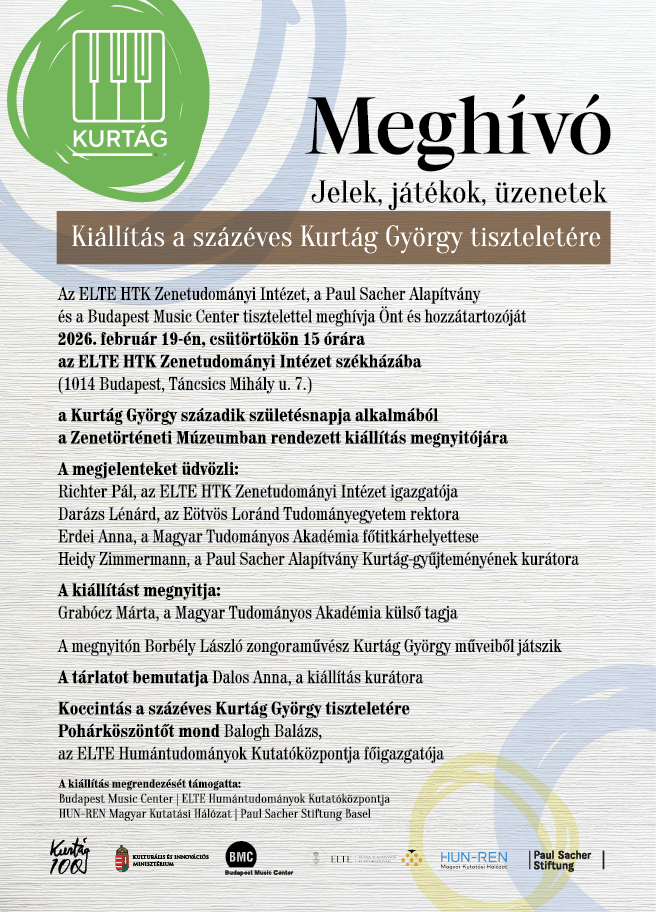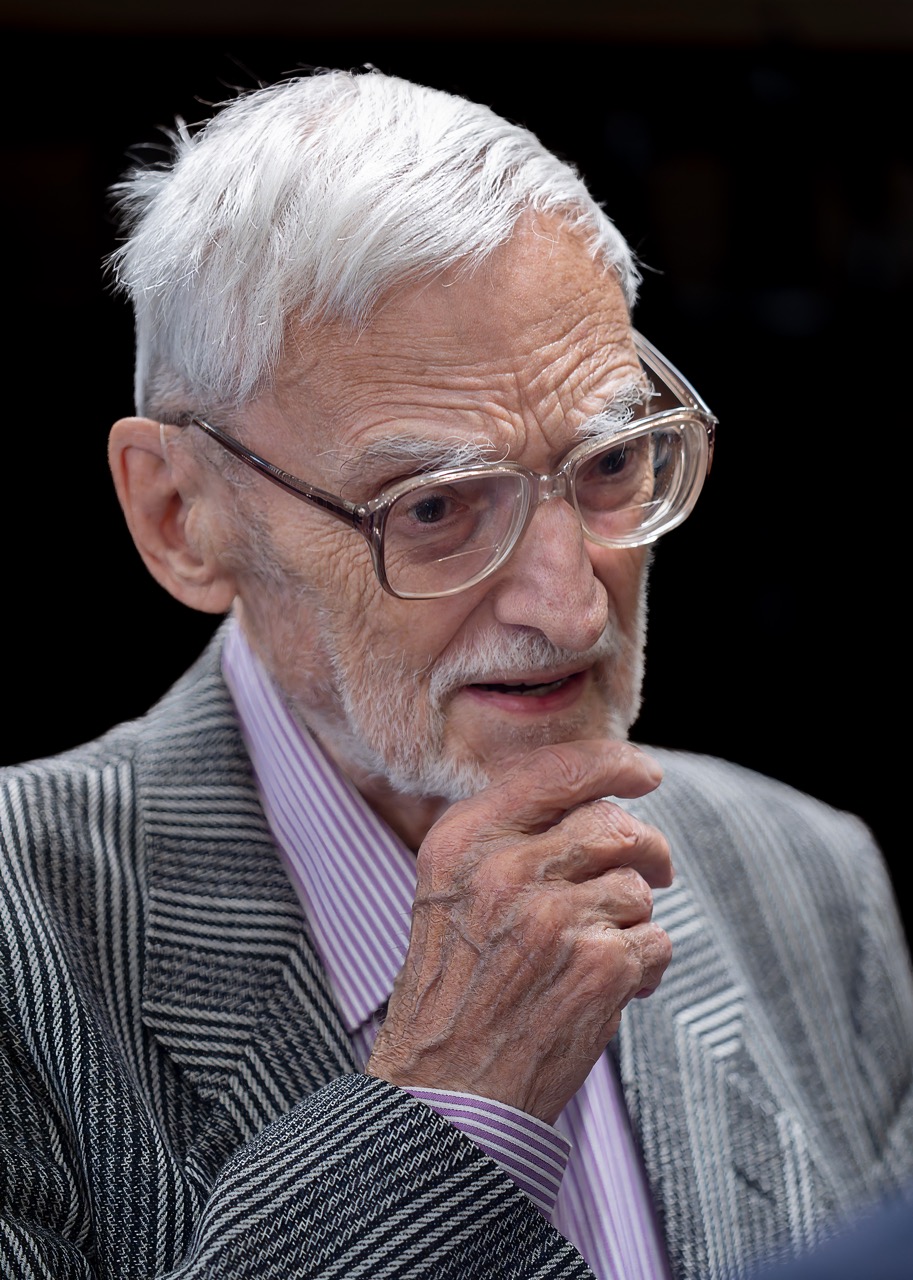Jelek, játékok, üzenetek – Kiállítás a százéves Kurtág György tiszteletére
|
|
Jelek, játékok, üzenetek – Kiállítás a százéves Kurtág György tiszteletére ELTE HTK Zenetudományi Intézet, 2026. február 19. csütörtök, 15 óra 1014 Budapest, Táncsics Mihály utca 7. |
 Az ELTE HTK Zenetudományi Intézet, a Paul Sacher Alapítvány és a Budapest Music Center tisztelettel meghívja Önt és hozzátartozóját 2026. február 19-én, csütörtökön 15 órára az ELTE HTK Zenetudományi Intézet székházába a Kurtág György századik születésnapja alkalmából a Zenetörténeti Múzeumban rendezett kiállítás megnyitójára.
Az ELTE HTK Zenetudományi Intézet, a Paul Sacher Alapítvány és a Budapest Music Center tisztelettel meghívja Önt és hozzátartozóját 2026. február 19-én, csütörtökön 15 órára az ELTE HTK Zenetudományi Intézet székházába a Kurtág György századik születésnapja alkalmából a Zenetörténeti Múzeumban rendezett kiállítás megnyitójára.
A megjelenteket üdvözli:
Richter Pál, az ELTE HTK Zenetudományi Intézet igazgatója
Darázs Lénárd, az Eötvös Loránd Tudományegyetem rektora
Erdei Anna, a Magyar Tudományos Akadémia főtitkárhelyettese
Heidy Zimmermann, a Paul Sacher Alapítvány Kurtág-gyűjteményének kurátora
A kiállítást megnyitja:
Grabócz Márta, a Magyar Tudományos Akadémia külső tagja
A megnyitón Borbély László zongoraművész Kurtág György müveiből játszik
A tárlatot bemutatja Dalos Anna, a kiállitás kurátora
Pohárköszöntőt mond Balogh Balazs, az ELTE Humántudományok Kutatóközpontja főigazgatója
Tudományos Fórum – Nakahara Yusuke
|
|
Nakahara Yusuke: Ismeretlen Bartók-vonatkozású dokumentumok a nagyvilágban ELTE HTK Zenetudományi Intézet, Bartók terem, 2026. február 19. csütörtök, 10 óra 1014 Budapest, Táncsics Mihály utca 7. |
László Somfai (1934–2026)
In the 92nd year of his life, László Somfai died on 11 February 2026. A Széchenyi Prize holder musicologist, he was a full member of the Hungarian Academy of Sciences and professor emeritus of both the Institute for Musicology, ELTE Research Centre for the Humanities and the Liszt Ferenc Academy of Music. During his long career, he became a central figure of Hungarian and international musicology. First president of the Hungarian Musicological Society between 1994 and 1998 and president of the International Musicological Society between 1997 and 2002. His achievements were acknowledged internationally by his foreign membership of the American Academy of Arts and Sciences (1997), the corresponding membership of the British Academy (1998) and the American Musicological Society (1988), as well as membership at the Zentralinstitut der Mozartforschung (Salzburg) and the Joseph-Haydn_Institut (Köln). His awards include, apart from the Széchenyi Prize (1999), the Academy Prize (1961), the Erkel Prize (1972), ASCAP Deems Taylor Award (1996) and the Hungarian Order of Merit (2015).
He had worked at the Budapest Bartók Archives of the Hungarian Academy of Sciences since 1963, serving as its head between 1972 and 2004, his official retirement. He continued working in his office, however, practically on a daily basis. Almost up until his final day, he participated in scholarly life with an exceptional sense of responsibility, helped editing the Béla Bartók Complete Critical Edition series, which he himself founded and worked on his Béla Bartók Thematic Index in preparation, which is an indispensable research tool for his colleagues as a guide to manuscripts and other documents of composition history. He started to teach at the musicology department of the Liszt Academy of Music in 1969 and it was his own decision in 2024 to end his 55-year-long eminent activity as a professor. In a long Hungarian interview shot last year, he named two of his English-language books (also available in Hungarian) as the most important, the two, published just a year apart by distinguished American publishers: his monograph on Joseph Haydn’s piano sonatas (The Keyboard Sonatas of Joseph Haydn. Instruments and Performance Practice, Genres and Styles. University of Chicago Press, 1995) and his study of Bartók’s works and compositional sources (Béla Bartók: Composition, Concepts, and Autograph Sources. University of California Press, 1996). Apart from books and articles published in Hungary and abroad – 469 publications are listed by MTMT, the Hungarian Bibliography of Scientific and Scholarly Publications – , his exceptionally rich bibliography also contains important critical and Urtext editions of music, facsimile editions of music manuscripts with commentary and pioneering editions and analyses of historic recordings. Particularly exemplary is his methodology in analyzing the relationship between musical notation and performance practice. He leaves an enormous void in musicology. Yet his pupils and colleagues will remember him with particular affection.
László Vikárius
Photo: János Posztós
Népzenegyűjtési jelentések az 1950-es évekből
Az akadémiai Népzenekutató Csoport 1950–60-as évekbeli népzenegyűjtéseinek eddig feltáratlan forráscsoportja került elő 2023-ban. Az 1739 kiküldetési jelentés személyes hangú terepleírásai a háború utáni magyar vidék életét és átalakuló hagyományát rajzolják ki – e dokumentumok bemutatására vállalkozik Riskó Kata, az ELTE HTK Zenetudományi Intézet tudományos főmunkatársa.
A teljes cikk elérhető az ELTE Humán Tudományok Kutatóközpontjának honlapján.
Prof. Dr. Oskár Elschek (DSc) etnomuzikológus (1931–2026)
 2026. január 11-én, 94 éves korában elhunyt Oskár Elschek, a szlovák és a nemzetközi népzenetudomány jeles személyisége. Pozsony szülöttjeként a II. világháború előtti generáció legtöbbjéhez hasonlóan a szlovák és német mellett magyarul is beszélt, s a tudományos életben az angol nyelv is hozzátartozott nyelvismeretéhez.
2026. január 11-én, 94 éves korában elhunyt Oskár Elschek, a szlovák és a nemzetközi népzenetudomány jeles személyisége. Pozsony szülöttjeként a II. világháború előtti generáció legtöbbjéhez hasonlóan a szlovák és német mellett magyarul is beszélt, s a tudományos életben az angol nyelv is hozzátartozott nyelvismeretéhez.
1954-ben végzett Pozsonyban a Comenius Egyetem zenetudományi és esztétika szakán. Még ugyanabban évben a(z akkor még Cseh)-Szlovák Tudományos Akadémia Művészet és Bölcsészettudományok Osztályának munkatársa lett, melynek 2005-ig aktív munkatársa, néhány éven át igazgatója volt.










